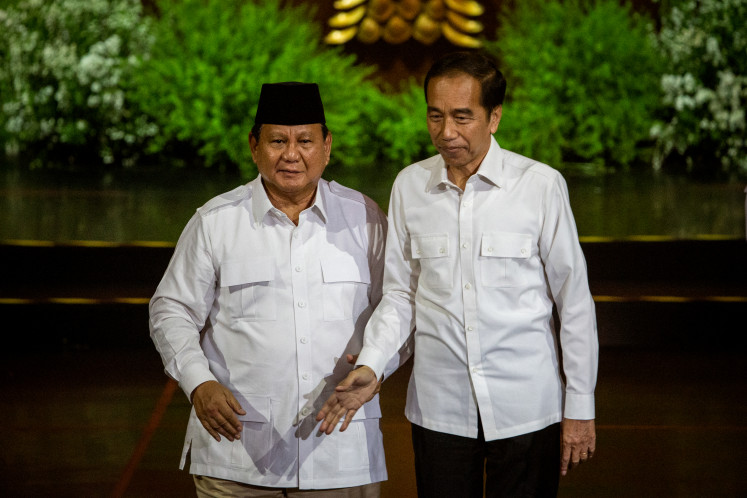Popular Reads
Top Results
Can't find what you're looking for?
View all search resultsPopular Reads
Top Results
Can't find what you're looking for?
View all search resultsLeveraging tech, increasing tax revenues
While a tax amnesty has been given a green light by the legislature, it will only provide a short-term boost of revenue collection. Indonesia’s tax collection, however, remains systematically problematic unless lasting and impactful changes are implemented. One way to do so is by extensive implementation of information technology.An overhaul of the tax office’s IT system will yield greater benefits for all stakeholders in the long term through a more robust and accountable tax administration system.
Change text size
Gift Premium Articles
to Anyone
N
o one in this world likes to pay taxes, no matter how generous they are. The problem with taxes can be traced back to the earliest recorded history when the scripts, the equivalent of a tax collector during the reign of the pharaohs in Egypt, imposed taxes on cooking oil.
Ever since then, taxation has evolved from its initial function to pay for emergency wartime expenditures to become the backbone of most governments’ spending in recent decades.
Taxes indeed have many beneficial functions without which a country’s development cannot be done in a sustainable manner. Moreover, they also serve as a tool to reduce inequality, bridging the gap between the rich and the poor. Nonetheless, the noble goal of taxes can only be achieved if a robust management system is in place.
It is not hard to explain why citizens are reluctant to pay their taxes. The instinct to keep what is ours and what we have earned to ourselves is wired deeply in our brains, thanks to the adventurous lives of our hunter ancestors.
Hence, it has become the task of governments to encourage their citizens to pay their dues.
Problems occur when a government is unable to do its job of creating an environment in which the people are willing to pay their taxes “happily”, as happened in Indonesia, Southeast Asia’s largest economy.
After years of reliance in oil and gas taxes, the world’s fourth most populous country is now forced to shift the taxation target onto trickier objects: income and corporate taxes.
The shift apparently has become a major hurdle for the Indonesian government. While it has a massive potential tax base, Indonesia’s tax to gross domestic product (GDP) ratio is among the lowest in the region (10.8 percent), outperformed by its regional peers such as Thailand (17 percent), Malaysia (15.5 percent), the Philippines (14.4 percent), Singapore (14.2 percent) and Vietnam (13.8 percent).
Low tax compliance and high tax evasion are the main antagonists that have caused Indonesia to miss its revenue targets for seven consecutive years and it does not need a rocket scientist to understand the roots of both: the unwillingness of Indonesians to pay what they owed to their country.
This issue can be traced back to perceived corruption by government officials, causing a loss of trust by taxpayers.
In addition, the outdated system and bureaucratic hurdles also make the idea of dealing with Indonesia’s Directorate General of Taxation seem unpleasant.
In line with the government aspiration to channel massive investments into crucial projects for infrastructure, health and education, tax collection has been put under a bright spotlight.
The government, through the tax office, has been trying to transform the image of taxation in Indonesia, something that should be appreciated given how inferior Indonesia’s taxation administration has been in prior decades.
While a tax amnesty has been given a green light by the legislature, it will only provide a short-term boost of revenue collection. Indonesia’s tax collection, however, remains systematically problematic unless lasting and impactful changes are implemented. One way to do so is by extensive implementation of information technology.
An overhaul of the tax office’s IT system will yield greater benefits for all stakeholders in the long term through a more robust and accountable tax administration system.
Combined with the modernization of several delivery channels, such as the registration and payment systems, it will generate positive effects and impressions, positioning the tax office to become more trustworthy in the eyes of taxpayers.
The implementation of new payment mechanisms such as e-billing is a very good starting step toward better tax compliance. It also creates an encouraging sign that the tax collection system in Indonesia is keeping up with the younger tech-savvy taxpayer generation, which will soon make up almost two-thirds of the entire population. Along with the online registration (e-registration) and tax report submission (e-filing) implemented earlier, the whole experience of dealing with the tax administration will be less painful since less paperwork and human interaction are needed.
The huge size of the potential tax base means terabytes of data. This will pose a huge challenge for the tax office should the agency be unable to manage it comprehensively. Utilization of big data technology must also be considered and the Indonesian government’s decision to allow the tapping of taxpayers’ credit card transaction and bank information will be the first test on how far the tax office can turn the abundance of data into actionable insights.
The implementation of business analytics and intelligence will enable the tax office to extract meaningful information, revealing even the slightest anomaly leading to tax evasion or other non-compliance activities.
Obviously, there are a number of success stories in this world from which the tax office can draw inspiration.
Take South Korea, for instance, where the implementation of a cash receipt system (CRS) has created an environment in which taxpayers are encouraged to report their retail transactions in order to obtain sizeable tax incentives.
While there is still a lot of work to be done in order to maximize the revenues and reduce the tax gap, the implementation of IT should be the very first step to achieve the sought-after robust and transparent tax management system in Indonesia.
This may be costly, complicated and time-consuming, but its impact could be a much needed reinforcement for Indonesia to live up to its tax potential.
***
The author is a business technology consultant and investment practitioner who holds an MSc in engineering with finance from University College London (UCL). The views expressed are his own.
---------------
We are looking for information, opinions, and in-depth analysis from experts or scholars in a variety of fields. We choose articles based on facts or opinions about general news, as well as quality analysis and commentary about Indonesia or international events. Send your piece to community@jakpost.com. For more information click here.










